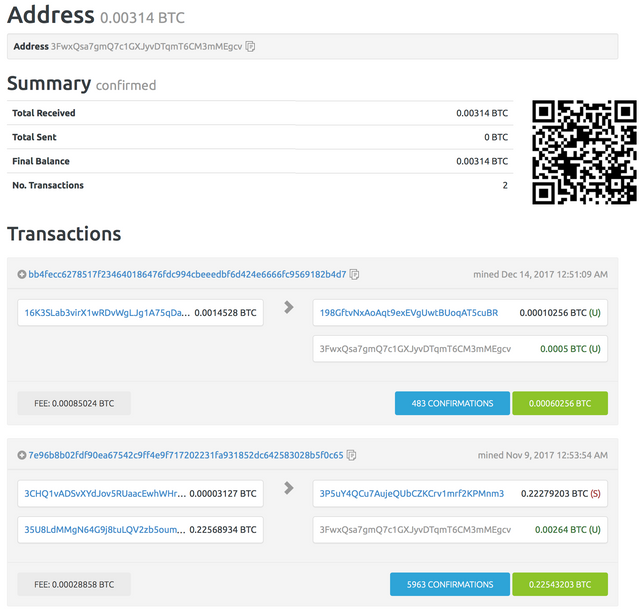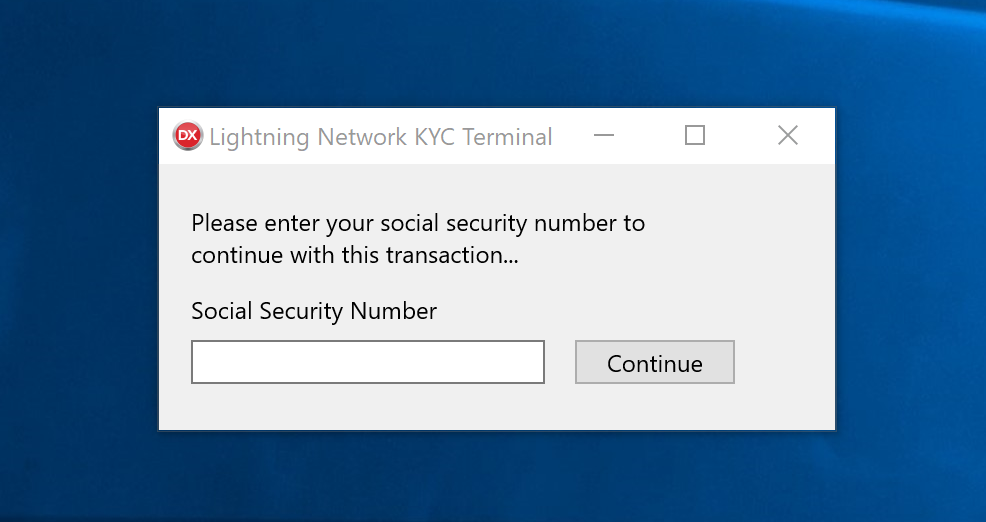Is Lightning Network a banker controlled implementation of Bitcoin?
I wrote a little bit about this yesterday but after a long series of posts, I didn’t have enough time to do my due diligence on all the claims it’s made. I now feel more certain that this video is making mostly bogus claims.

(Google Images - Wikimedia Commons)
While I’m a programmer, I haven’t had the time to study Lightning Network code which is open source. Having code being open source is the surest way that we know that nothing nefarious exists in the implementation. Cypherpunks all over the world are constantly trying to stake their claim to fame by finding the one liner that the NSA snuck in. If the build is not consistent with the code, then the checksums won’t match and you know you’re dealing with a tampered file or executable.
This is the first issue that makes it very unlikely that banks can take over control of the hubs, but there’s more… A bitcoin public address on the blockchain looks like this…
You will see the bitcoin public address at the top, the transaction id’s (there are only two at this address), and the encumbrances showing the source and destination.
Do you see any fields that have attached a social security number, name or phone number, etc? No. This is why exchanges like Coinbase have KYC (Know Your Customer) and AML (Anti Money Laundering). They have to have knowledge of the originating address to know who that address belongs to.
So if these LN hubs are going to operate as a "bank", then when you send a transaction from your hardware wallet whose address has never been used before, they will have to insert a form in between each transaction to collect your social security number, your name, address, etc. Will you fill this form out?
I decided to demonstrate how ridiculous this is by showing you what I would do as a programmer in my Delphi IDE to try to request this information…
My understanding of hubs so far is a bit different. They aren't supposed to be operated by anybody but represent a pool of assets from many different resources that search for routes to settle direct P2P in the event that one party doesn't have enough bitcoin to settle a transaction between two parties.
If I was programming bitcoin Lightning Network nodes I would just set up a class with the records of all open channels and call it a THub object. This THub would have a dynamic array of all the open channels and the amounts. It would probably need a binary sort search procedure that orders the amounts of each of the channels from greatest to least, so that settlement chains could be found in the hierarchy chain.
Imagine this situation. Suppose someone in front of you in line at a convenience store has a $100 bill and you're behind them and they are talking to the merchant who doesn't have enough change to cover it. You overhear the conversation and instead of trading with the merchant directly, what I've done is given five twenty's to the customer in front of me in exchange for that $100 bill (+ 10 cent fee). Then the customer can complete the transaction with the merchant for one of his $20’s instead. In this situation I operated as a hub. I didn't ask for his name, social security number, phone number, etc.
So the simple solution is this. If you've never provided KYC info on yourself and a node pops up asking for KYC, just say no. If you don’t provide this information, then authority has to guess at it by following the address chains.
So why would someone put forth this conspiracy theory? Ask who benefits (cui bono). In this case, since we know that there's been a bitcoin civil war going on for more than a year about how to scale bitcoin, it looks like something cooked up by a BCH supporter.
Personally I'm not against larger block sizes, but there really is an important reason for doing scaling right this time:




Thanks for this informative post. As I am not versed in cryptography, I do not understand much of what has been going on in the space.
But apparently there has been a bit of fear-mongering going on. I saw the above vid on $Vigilante's blog, and it sounded rather "fearsome." Almost too fearsome, so I appreciate your insights here.
As for the BTC -- BCC conflict, I have paid some outrageous fees just for moving a bit of bitcoin from an exchange to a wallet, as well as from wallet to wallet. That's something which is rather disturbing, and which makes me lean in favor of Bitcoin Cash.
Jeff is a good friend of Roger Ver's and Roger spearheaded BCH. The problem is not that there's something wrong with 8 MB blocks, but that this solution will only work until next summer at best at the rate of adoption of bitcoin, then you'd just have to raise the block size again. By the time you're up to petabyte blocks because you want to do streaming money, you're in an impossible range for processing power which will require a great deal of centralization to accomplish (ordinary people won't be able to afford the machines capable of handling transactions on this scale). Then you might as well just set up a new bank.
The problem is that non techies don't understand that this is why the internet is screwed up and the NSA owns all 5 backbone providers in the world. We don't want to make the same mistake this time, or we continue down the path to a digital panopticon.
Yes, I know that Roger is one of those behind BCH, and he's very adamantly been proselytizing it.
(I've re-read your post, and now it's a bit clearer.) Just for clarification, did you mean to say that BCH's 8 MB blocks will be obsolete or redundant or insufficient by next summer?? If so, that sheds a whole new light, for me, on the conflict.
It will also help me greatly in my coming decisions regarding whether to shift my coins to either BTC or BCH. Thanks!
It would have been insufficient if it had been the standard that made it with the NYA without a fork. But because it forked, the strain was taken off BCH so it's not handling nearly the load that bitcoin is handling right now.
For that reason, I expect that BCH will not have much problem for a quite a while unless it becomes bitcoin and takes over. Then they will very quickly have to increase block size again.
I do think that the scaling issue will weigh heavy on bitcoin this coming year. I predicted a couple months ago that 2018 would be the year that market cap spreads out into the altcoins. However, many altcoins don't have scale either so if they start having the network load of bitcoin, they will fail too.
The exceptions that I know so far are Bitshares, EOS (in the future) and of course Steem. The graphene DPoS tech of Dan Larimer solved these issues. I do worry a bit that having 21 witnesses might be a bit too centralized, but so far I haven't seen any problems.
They are working on being able to scale to visa capacity. They had a trial recently that proved it was possible
Who is "they"? Do you have documentation on this?
Sorry, "They" are one of the bitcoin cash teams
https://news.bitcoin.com/gigablock-testnet-researchers-mine-the-worlds-first-1gb-block/
Personally I don't think this is necessarily the best way to scale. I think solutions like cordano or eos are more likely to be the future but I think it's better than segwit
interesting read
I think you misunderstand his point. He's not saying that the "banks" as in the companies are taking over, he's talking about the people who control the world banking system. If you "follow the money", you'll see that the people who benefit from the lightning network are the people building these hubs which happen to be the same people who are funding bitcoin development. While that isn't necessarily nefarious, it is something to look into because it is a clear conflict of interest. Why do you think the miners hated it so much? They are basically taking the fees that the miners should get for themselves.
Hope that clears it up a bit. We have to watch this one very carefully.
Ps, as I mentioned in another comment bch has proven that it is at least possible for them to scale to visa level on chain.
There are apparently some people in Blockstream associated with the Bilderbergers, but so far their commits to the open source github aren't proprietary. If they go against the current rules then a fork occurs. I can't see the banks forcing a FedCoin onto core without it becoming completely obvious what they are doing and then losing all of their following.
Did BCH figure out a way to keep increased block sizes from centralizing mining?
That was segwit, the biggest fundamental change to how bitcoin works and how it is intended to work. They forced the minors to accept it which is against the whole governance of bitcoin is supposed to work. Not to mention that anyone that spoke out against segwit was shouted down and censored (not on steemit of course). The whole thing was very fishy. I don't know if it's necessarily a "take over" of bitcoin but it sure is screwing up how well it works. The original plan was to increase block sizes when that was necessary. Storage is cheap and gets cheaper every year. Even at 1 GB block the storage wouldn't be the issue.
As far as block sizes centralizes mining, as far as I understand it, proof of work in general (as it is currently done) is what causes centralization. The storage isn't the limiting factor for people wanting to get into mining it's the hashrate/electricity.
That all being said, like I said in my other reply I think both segwit and increased block sizes are poor solutions and will be overtaken (hopefully) by some of these new ingenious ideas. (Cardano is my favorite right now but at the speed that this stuff changes I'll probably have a new favorite by dinner!)
Actually the biggest problem with this...
Right, but try fitting giga - petabyte blocks through your internet connection. I think the inventions of Dan Larimer (which have already been tested in Steem and Bitshares and likely succeed in EOS) have solved the transaction speed problem. Market cap will likely flow into the alts this coming year... What does Cardano use for PoW replacement?
Good point! We don't know how well the internet speeds will scale.
Cardano currently uses some sort of proof of stake that randomly selects the next block leader with the bigger stakes getting a bigger probability of being selected. I'm just starting to research it more deeply but this video really got me excited!
https://www.cardanohub.org/en/what-is-cardano/
reasteam done
may be a question dear friend
@zoidsoft payed 1.0 SBD to @minnowbooster to buy a stealth upvote.

transaction-id 7680b005e245d76a2afca52863afe2603577fd34
@stealthgoat
This post has received gratitude of 1.41 % from @appreciator thanks to: @zoidsoft.
This post has received a 13.34 % upvote from @boomerang thanks to: @zoidsoft
@boomerang distributes 100% of the SBD and up to 80% of the Curation Rewards to STEEM POWER Delegators. If you want to bid for votes or want to delegate SP please read the @boomerang whitepaper.
This post has received a 1.02 % upvote from @buildawhale thanks to: @zoidsoft. Send at least 1 SBD to @buildawhale with a post link in the memo field for a portion of the next vote.
To support our daily curation initiative, please vote on my owner, @themarkymark, as a Steem Witness